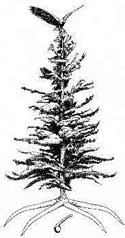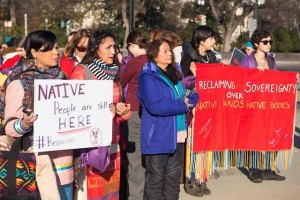
The Onondaga Nation and democratic governance have been synonymous for centuries. On the shores of our sacred Onondaga Lake, the Peacemaker united five warring peoples by giving us a system of governance based on using the Good Mind to make decisions for the coming 7
Unfortunately after the Canandaigua Treaty in 1794, relations between the United States and Native Nations began to change. The state of affairs between the two became one of the United States trying to assimilate native peoples into this new ‘American’ culture. Part of this effort was the attempt to dissolve native governments.
Promises of aid. Recognition from the President. Reassurances of land security. Laws banning traditional ceremonies. These factors led many nations to changingfrom their traditional leadership methods to a general election system with tribal courts and judges. These can be seen all across Turtle Island, even in the land of the Seneca and Mohawk Nations.
When this pressure faced the Onondagas, the people had to make a decision. To continue their way of governance or to switch to a United States sanctioned government with the promises of aid but at the loss of our ability to determine our own path. The Onondagas choose sovereignty. It must have been difficult at first seeing the surrounding nations being awarded different programs while the Onondagas were did not. Often others who aren’t informed of the position of the Onondaga Nation often assume that the people get funded for this or that. Therefore there is a lot of pride in the things that we do accomplish because we decided to do it, and we did it without the aid of Federal or State help.
 But I am extremely grateful for our position when I read news like the following in the New York Times: Justices Weigh Power of Indian Tribal Courts. In December 2015, the United States Supreme Courtis hearing arguments that the Choctaw government and tribal court system does not have ‘authority to rule’ on a case that involved a young Choctaw teen and a business located on their lands. They may rule that the Constitution does not ‘apply’ to Native governments and their tribal courts.
But I am extremely grateful for our position when I read news like the following in the New York Times: Justices Weigh Power of Indian Tribal Courts. In December 2015, the United States Supreme Courtis hearing arguments that the Choctaw government and tribal court system does not have ‘authority to rule’ on a case that involved a young Choctaw teen and a business located on their lands. They may rule that the Constitution does not ‘apply’ to Native governments and their tribal courts.
The Choctaw choose the path of elected officials and tribal courts. They have followed the path that was asked of them from the United States on how to govern and settle disputes. The Choctaw did what was asked of them. They moved away from their traditional government system. They fly the United States flag in their courts. It doesn’t seem to matter.
I am grateful of our ancestor’s decision to continue down the path laid before us with by the Peacemaker.
Da•ne’thoh,
Dehowähda•dih
